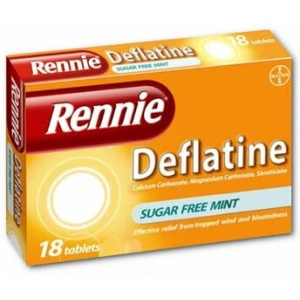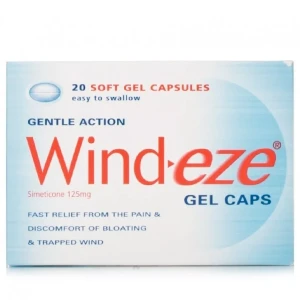Trapped Wind
Here at Prescription Doctor, we offer a range of treatments that can help alleviate trapped wind. All items are dispatched from our UK pharmacy in discreet packaging. Scroll down to see our products.
Rennie Deflatine
- Chewable tablets
- Mint flavoured
- Treats both heartburn and trapped wind
Wind-Eze Gel Caps
- Relieves trapped wind
- Easy to swallow
- No prescription required
Trapped Wind and bloating
Trapped wind occurs when gas, such as air, becomes trapped in the digestive tract. It can cause uncomfortable bloating and stomach pain, as well as burping and flatulence.
Symptoms of trapped wind include:
- Pain in the upper abdomen
- Bloating
- Stomach cramp
- Burping
- Flatulence (breaking wind)

In some cases, the pain can radiate from the stomach, resulting in pain in your chest, just below your rib cage, back pain or pain in your lower abdomen.
If the pain you are experiencing is particularly severe or has persisted for a long while, you should speak to your doctor.
Why does trapped wind hurt?
The reason trapped wind causes pain is simply due to the pressure it exerts on your stomach and intestines.
Everyone experiences trapped wind differently. While one person might experience only mild pain, those with conditions which affect the digestive tract, such as Crohn’s disease, might experience more severe pain.
How long does trapped wind last?
It is difficult to tell how long trapped wind symptoms will last, but they can last for a few hours.
What causes trapped wind?
Trapped wind can be caused by a range of dietary, environmental, medical or lifestyle factors. For some, the cause of their flatulence can be managed, but there is no single best way to get rid of trapped wind which would work for everyone.
Keeping a food diary can help you identify foods and activities which cause wind.
Diet and food intolerances
Many foods cause trapped wind, flatulence, and belching. Foods rich in protein and fibre are typical culprits.
Baked beans, fish, red meat and other foods with a high protein content are generally well-known for causing gas. But they are not bad for you - in fact, protein is very important for our muscles.
Calciferous vegetables like broccoli, cauliflower, cabbage and sprouts can also cause a buildup of gas in the intestine. As bacteria break these vegetables down in the intestines, gases are released, which can lead to discomfort and bloating.
Carbonated drinks, including fizzy pop, beer and sparkling water, can cause a buildup of gas in the stomach, resulting in burping and pressure. Drinking from straws can also cause you to accidentally swallow air, resulting in trapped wind. Sipping from a cup can help prevent you from accidentally swallowing air, which can lead to bloating and wind.
Intolerances to sugars often cause trapped wind. Lactose intolerance and coeliac disease can cause bloating, sickness, flatulence, burps accompanied by an unpleasant taste, discomfort and diarrhoea. If you have an intolerance, be sure to check the ingredients before eating. You may not be aware you have an intolerance, in which case you should speak to your GP.
Medicines and medical conditions
Some medicines can increase your risk of trapped wind, bloating and flatulence. You can check whether a medicine may be the culprit by reading the side effects found within the patient information leaflet enclosed with your medicine.
Medicines used to treat constipation, high cholesterol (particularly statins) and weight loss medicines like Orlistat all list flatulence as a common side effect.
It’s important that you do not stop taking any medicine which you have been prescribed without first speaking to your doctor.
Certain medical conditions, especially those that affect the digestive tract, can increase the chances of trapped wind. Irritable bowel syndrome (IBS), Crohn’s disease, coeliac disease and giardiasis are just a few examples of health conditions that can increase your risk of trapped wind and flatulence.
Lifestyle
Your lifestyle can significantly contribute to the development of trapped wind and flatulence.
Not only what you eat and drink, but also how you eat and drink can be a contributing factor to trapped wind. Eating quickly and swallowing large amounts of food without thoroughly chewing it can cause you to inadvertently swallow air, as can gulping down drinks too quickly.
Eating slowly with your mouth closed and thoroughly chewing your food before swallowing it can help you minimise the risk of accidentally swallowing air. Taking small sips of drinks rather than large gulps can also help you avoid swallowing large quantities of air, which may later cause bloating and stomach pain.
After eating a meal, avoid lying down. Sitting up can help air to escape your oesophagus more easily. Lying down after a meal increases your risk of heartburn and trapped wind, as gas is less likely to travel out of the body through the oesophagus. You should wait for at least an hour after eating before having a nap.
Exercising immediately after a meal can also cause trapped wind and stomach cramps, and should therefore be avoided.
Habits like chewing gum and smoking can often cause you to swallow air, which can lead to trapped wind. Speak to your doctor about quitting smoking and cutting down on chewing gum if you think you are chewing it too often.
Pregnancy
Pregnant women are more likely to experience trapped wind, due to a change in hormones which relax the muscles around the stomach.
Mild gastrointestinal problems, such as heartburn and constipation, are quite common during pregnancy.
While several treatments are available, it’s best to consult your doctor or pharmacist to ensure they are safe to take during pregnancy. Even if you took them safely before, they may no longer be safe to take.
It’s important to be cautious of any pain you experience in your belly during pregnancy. If you have any concerns about any pain you are experiencing in your abdomen, speak to your doctor or midwife.
How can I get rid of trapped wind?

While most cases of trapped wind aren’t serious, it can be very uncomfortable and painful. Luckily, there are a number of ways you can get rid of trapped wind.
In many cases, releasing the trapped wind from your body is the most effective method to relieve the pain, although this can be challenging. Burping and breaking wind are the body's natural ways of removing trapped gas.
Try going to the toilet. Passing a stool may help wind trapped in the intestines escape. Even if you don’t pass a stool, breaking wind can relieve pressure and pain in your intestines.
Light exercise can help move the gas along the digestive tract. Light stretching, a short walk, or other gentle exercises like Yoga can help expel wind. Avoid any heavy or strenuous exercises, especially shortly after eating.
What can I take for trapped wind?
There is a range of different products available over the counter for trapped wind.
According to Harvard Medical School, there is “limited or non-existent” formal scientific evidence on many treatments available for trapped wind, despite the abundance of anecdotal evidence. Regardless, a range of treatments is available, which are generally regarded as safe for most people.
Simeticone (Simethicone) - available under the brands WindSetlers and Deflatine - is a common treatment for trapped wind. It is found in a wide range of products, including those intended to treat diarrhoea such as Imodium Comfort.
Peppermint is prolifically touted as a treatment for gastrointestinal problems, from nausea to constipation. A study from the University of York found peppermint oil to be “more effective than placebo for treating irritable bowel syndrome”. Peppermint teas, enteric-coated capsules, oils, and lozenges can be worth trying if you are suffering from indigestion, constipation, or trapped wind.
Activated charcoal - often available at health food shops and pharmacies - is another treatment claimed to be effective for trapped wind and other gastrointestinal problems.
Before taking any medicine, you should speak to your doctor or a pharmacist to make sure it’s safe for you. In most cases, simeticone (simethicone) and peppermint extracts are unlikely to cause side effects, but they may not be suitable for you if you have certain underlying conditions or are taking certain medicines.
Additional Resources
Authored & Reviewed By

Mohamed Imran Lakhi
MPharm - Lead PharmacistPublished on: 12/03/2021 Reviewed on: 18/05/2023
© 2013 - 2026 Al Muhsineen Limited. All Rights Reserved. Registered Pharmacy: 34 Halliwell Road, Bolton BL1 8RL. Registered Office: 254 First Floor, Shearbrow, Blackburn, England, BB1 8DS








